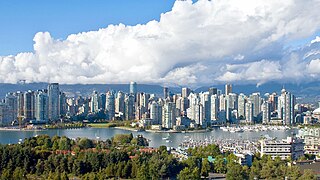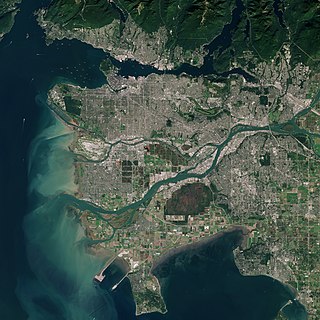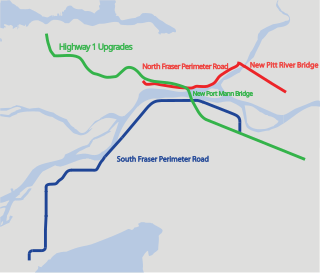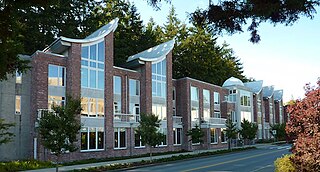This article has multiple issues. Please help improve it or discuss these issues on the talk page . (Learn how and when to remove these messages) |
This article has multiple issues. Please help improve it or discuss these issues on the talk page . (Learn how and when to remove these messages) |
Heritage Preservation Act (Provincial NDP introduces this) Development of South West False Creek
Post Expo – high density urban development plan Gordon Campbell elected Mayor – puts greater focus on the regional district

Vancouver is a major city in Western Canada, located in the Lower Mainland region of British Columbia. As the most populous city in the province, the 2021 Canadian census recorded 662,248 people in the city, up from 631,486 in 2016. The Metro Vancouver area had a population of 2.6 million in 2021, making it the third-largest metropolitan area in Canada. Greater Vancouver, along with the Fraser Valley, comprises the Lower Mainland with a regional population of over 3 million. Vancouver has the highest population density in Canada, with over 5,700 inhabitants per square kilometre (15,000/sq mi), and the fourth highest in North America.

The University of British Columbia (UBC) is a public research university with campuses near Vancouver and Kelowna, in British Columbia, Canada. Established in 1908, it is the oldest university in British Columbia and oldest Canadian university west of Winnipeg. With an annual research budget of $893 million, UBC funds 9,992 projects annually in various fields of study within the industrial sector, as well as governmental and non-governmental organizations.

The Metro Vancouver Regional District (MVRD), or simply Metro Vancouver, is a Canadian political subdivision and corporate entity representing the metropolitan area of Greater Vancouver, designated by provincial legislation as one of the 28 regional districts in British Columbia. The organization was known as the Regional District of Fraser–Burrard for nearly one year upon incorporating in 1967, and as the Greater Vancouver Regional District (GVRD) from 1968 to 2017.

The Vancouver International Film Festival (VIFF) is an annual film festival held in Vancouver, British Columbia, Canada, for two weeks in late September and early October.
Matthew Laird is a Canadian academic, activist and politician. Having helped lead numerous political campaigns he continues to work with community groups on social and environmental issues.

Peter Ladner is a former Vancouver city councillor, Metro Vancouver vice-chair and business owner.
Heather Deal is a Canadian biologist and politician. She served as a Vancouver city councillor until 2018, first elected as a member of Vision Vancouver in 2005. She previously served as a Vancouver Park Board commissioner for the 2002 to 2005 term as a member of Coalition of Progressive Electors.

Gregor Angus Bethune Robertson is a Canadian businessman and a progressive politician, who served as the 39th mayor of Vancouver, British Columbia, from 2008 to 2018. As the longest consecutive serving Mayor in Vancouver's history, Robertson and his team led the creation and implementation of the Greenest City 2020 Action Plan and spearheaded the city's first comprehensive Economic Action Strategy.
Walter Hardwick was an academic and community leader whose work shaped the city and region of Vancouver. Professor Emeritus Hardwick was involved in public life in British Columbia at the civic, regional, provincial, national and international levels. His longest service to the Province was through his teaching and scholarship; he taught in the Department of Geography at the University of British Columbia (UBC) for over thirty years. He is the father of former Vancouver City Councillor Colleen Hardwick.

The Gateway Program is a C$3.0 billion regional transportation project for Metro Vancouver and surrounding areas that is being managed by the British Columbia Ministry of Transportation. The ministry introduced the Gateway Program on January 31, 2006, as a means to address growing congestion and reduce travel times. The bulk of the construction took place from 2006 to 2014 and saw the completion of the Pitt River Bridge, the Port Mann Bridge, improvements to Highway 1 and construction of the South Fraser Perimeter Road.
The EcoDensity Initiative was officially launched in 2006 in Vancouver, British Columbia, Canada, in conjunction with the World Urban Forum. The initiative was a response to deconcentration of urban land use due to urban sprawl. The initiative used density, design and land use as catalysts towards livability, affordability and environmental sustainability. Some of the program's objectives were to reduce car reliance, deliver more efficient urban land use, improve green energy systems and build a resilient and adaptable community. In high-density urban areas, utilizing the existing infrastructure and transit and community amenities tends to lead towards a more sustainable and livable state. Accordingly, EcoDensity was designed to strategically enhance densification with the primary aim of efficiently structured neighbourhoods, denser urban-patterns and increased affordable housing.
Andrea Reimer is a Canadian politician, who served on Vancouver, British Columbia's City Council from 2008 to 2018. She was first elected in 2002 to the Vancouver School Board as a Green Party candidate. She was defeated as a Green Party candidate in her re-election campaign in 2005 and then joined the Vision Vancouver party to support Gregor Robertson's mayoral campaign. She subsequently ran for and won a council seat in the 2008 municipal election. After serving four terms on council, she chose not to run for re-election in the 2018 municipal election. She is currently an adjunct professor at the School of Public Policy and Global Affairs at the University of British Columbia and Simon Fraser University, and served on the UBC Board of Governors as a provincial appointee from December 2019 to October 2020.
Sadhu Aufochs Johnston was the City Manager of Vancouver, BC from March 2016 until January 2021 where he was responsible for managing the operations of the City, including oversight of a budget of over $1.6B and over 7,000 staff. As City Manager he spearheaded initiatives to address the growing housing and climate change crisis in Vancouver. He was the Chief Environmental Officer of Chicago and Deputy Chief of Staff to Mayor Richard M. Daley, until he was appointed Deputy City Manager of Vancouver, British Columbia, Canada in 2009. Johnston previously served as the Executive Director of the Cleveland Green Building Coalition. He is co-author of "The Guide to Greening Cities" published by Island Press in 2013. In 2008, Johnston co-founded the Urban Sustainability Directors Network (USDN) and served as the Chair of the Executive Committee of STAR, community sustainability rating system. Johnston served on the selection committee for the Partners for Places Fund, a partnership between USDN and the Funders Network for Smart Growth and Livable Communities as well as the Greenest City Fund in partnership with the Vancouver Foundation.

The C. K. Choi Building is an educational building on the campus of the University of British Columbia (UBC) known for its sustainable design features. Named for businessman and philanthropist Dr. Cheung-Kok Choi, the building houses UBC's Institute of Asian Research. The architecture of the building implements Asian motifs.

The University Endowment Lands (UEL) is an unincorporated area that lies to the west of the city of Vancouver, British Columbia, Canada, and adjacent to the University of British Columbia (UBC) and the lands associated with that campus. Pacific Spirit Regional Park lies within the UEL. The UEL is part of Metro Vancouver. Mail sent to the UEL is addressed to "Vancouver" rather than the UEL.
Vancouver City Savings Credit Union, commonly referred to as Vancity, is a member-owned financial co-operative headquartered in Vancouver, British Columbia, Canada. By asset size, Vancity is the largest community credit union in Canada as of 2019, with CA$28.2 billion in assets plus assets under administration, 60 branches and more than 543,000 members.
The SkyTrain rapid transit system in Greater Vancouver, Canada, was conceived as a legacy project of Expo 86 and was finished in time to showcase the fair's theme: "Transportation and Communication: World in Motion – World in Touch". Construction was funded by the provincial and federal governments. Vancouver had plans as early as the 1950s to build a monorail system, with modernist architect Wells Coates pencilled in to design it; that project was abandoned. The lack of a rapid transit system was said to be the cause of traffic problems in the 1970s, and the municipal government could not fund the construction of such a system. During the same period, Urban Transportation Development Corporation, then an Ontario crown corporation, was developing a new rapid transit technology known as an "Intermediate Capacity Transit System". In 1980, the need for rapid transit was great, and Ontario needed buyers for its new technology. "Advanced Rapid Transit" was selected to be built in Vancouver to showcase the Ontario project at Expo 86.

Robert Arthur Williams was a Canadian consultant and political figure in British Columbia. He represented Vancouver East in the Legislative Assembly of British Columbia from 1966 to 1976 and from 1984 to 1991 as a New Democratic Party (NDP) member.

The architecture of Vancouver and the Greater Vancouver area consists of a variety of modern architectural styles, such as the 20th-century Edwardian and the 21st-century modernist styles. Initially, the city architects embraced styles developed in Europe and the United States, with only limited local variation.

The 2022 Vancouver municipal election was held on October 15, 2022, the same day as the municipal elections held throughout British Columbia. Voters elected the mayor of Vancouver by first-past-the-post. Ten city councillors, 7 park board commissioners, and 9 school board trustees were elected through plurality at-large voting. In addition, voters were presented with 3 capital plan questions.